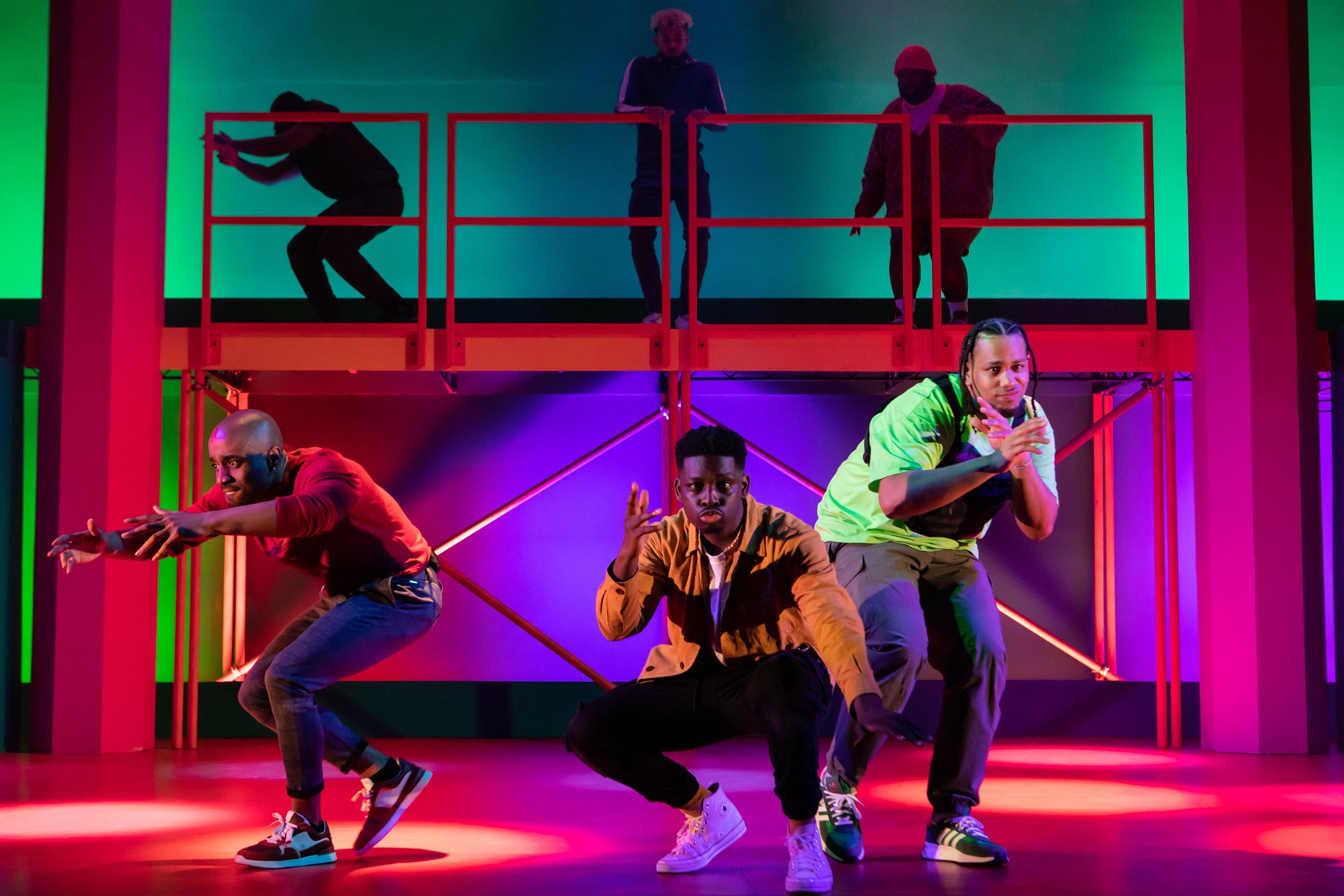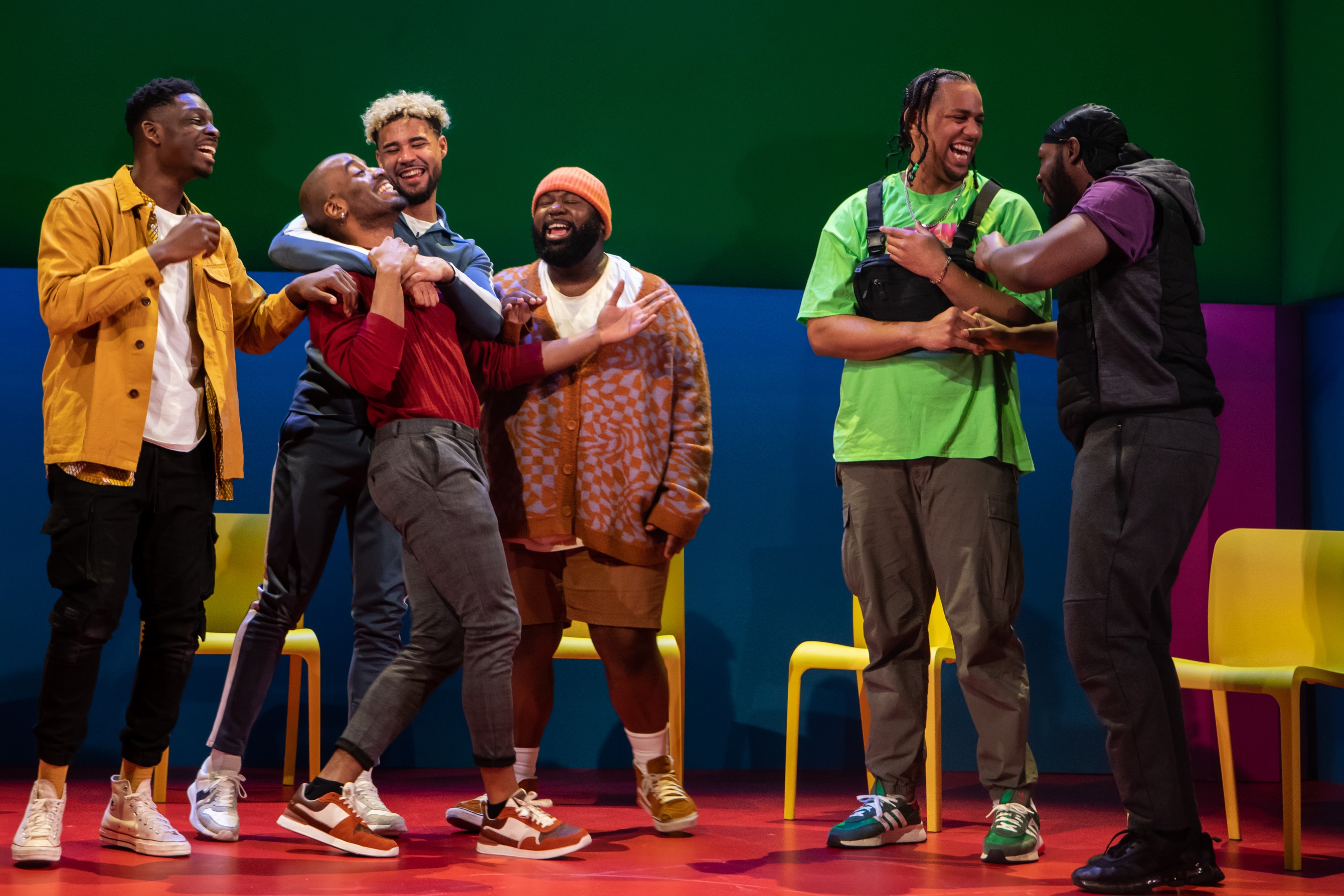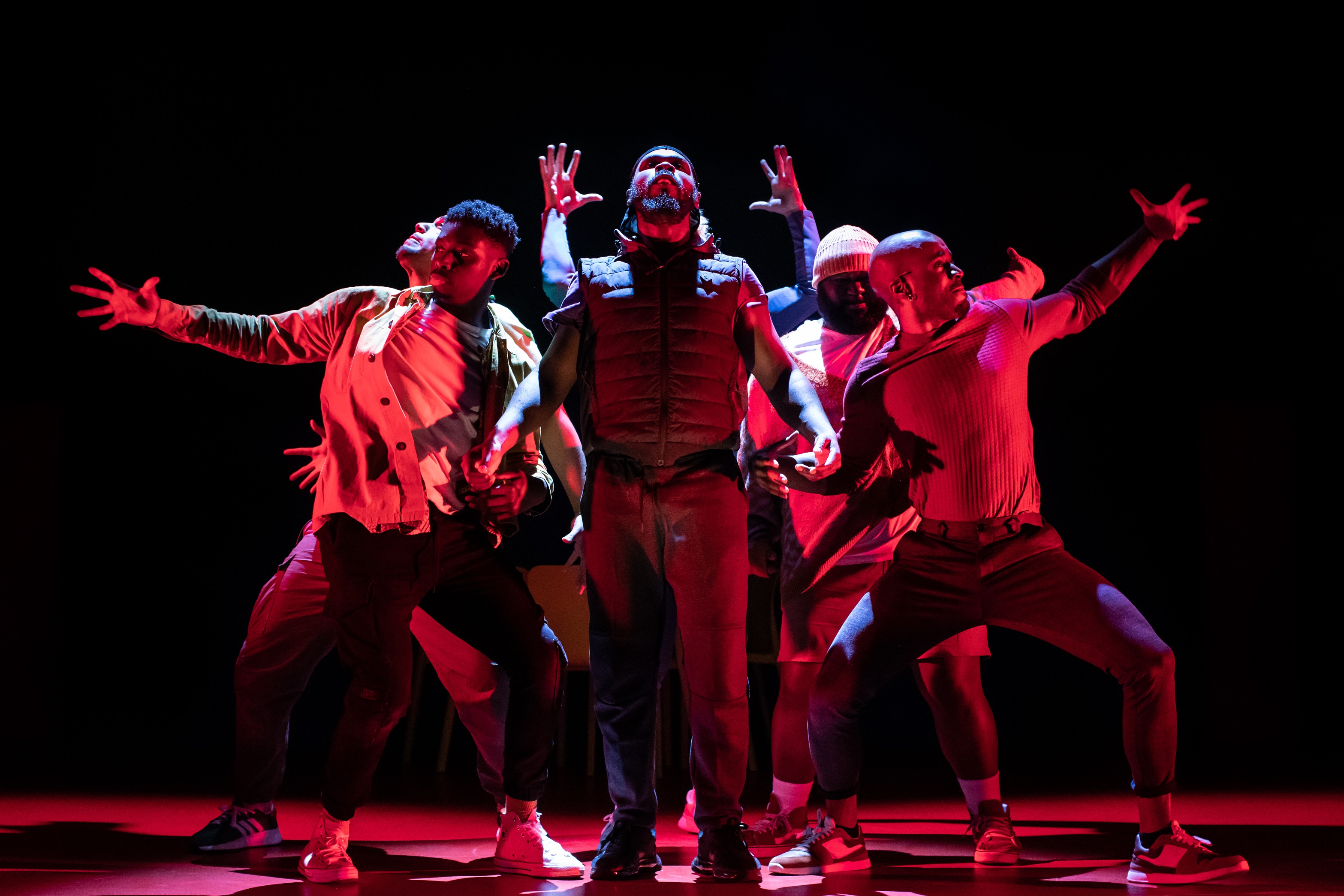"For Black Boys..." shows there's still work to be done for Black male mental health
Powerful, groundbreaking and nuanced, the acclaimed play enters the final week of it West End run.
“Black boys, Black boys, yeah, we’re all Black boys, and one day we’re gonna be Black men, and one day we might have Black boys, and we gotta teach them to be Black men”.
These words from rapper Bashy’s ‘Black Boys’ play as audiences settle in to watch ‘For Black Boys Who’ve Considered Suicide When The Hue Gets Too Heavy.’ First opening in 2021, the play became a must-see in the theatre world for its moving portrayal of the nuances of Black manhood- a welcome difference to the overwhelmingly negative portrayals too often seen in the media.
Born from the lived experience of its writer and director Ryan Calais Cameron, the play’s return has been credited with empowering Black men to examine their mental wellbeing and share their stories as a means of liberating them from the burden of dealing with these issues by themselves.
Led by six actors and currently on at the West End’s Apollo Theatre, ‘For Black Boys’ has a newfound level of notoriety, and has been championed for kick-starting necessary conversations that have been considered taboo.
It tells the authentic, and sometimes harsh reality of the Black male experience, dissecting all things from fatherhood, to sexualisation of young boys, to the notion of what it means to be a man. The play derives its name from Ntozake Shange's 1975 theatre piece ‘for colored girls who have considered suicide/ when the rainbow is enuf’; a play embodying the joy, pain, and tragedy Black women go through, accompanied by movement, music and choreography. Inspired by what was a groundbreaking and intimate portrayal of Black womanhood in 1970s America, ‘For Black Boys’ offers a similar experience for its audience, providing a window into Black manhood in 21st century Britain, in all its variations.
Set in a group therapy session, we watch the characters in a stream of consciousness, baring their souls, thoughts and feelings to one another with dialogue, and where words aren’t enough, using movement and music to embody these feelings. Yomi*, who’s chosen to keep his real name private, says he remembers “coming out of the theatre and going on Spotify to listen to Kendrick Lamar’s ‘The Blacker The Berry’ immediately. There’s a scene when that song is played and the lyrics move me everytime.” He adds that it was freeing to see “the way toxic masculinity was dismantled. The puffing out of the chest and ego was great, it was like physically seeing the idea of the strong Black man torn apart and I loved it.”
With the help of movement directors and drama therapists, each monologue is brought to life by the actors who jump in and out of characters to give the audience a thorough understanding of the experience they’re detailing.
“I really enjoyed the choreography and storytelling”, says Ash, a music producer who recently went to see ‘For Black Boys’. He adds that it was surprising to see “the blend of traditional stage acting with krumping; it really expressed the frustration and rage that I’ve felt at times and I know other Black men feel, but in a way that we understand.”

Nnabiko Ejimofor, Aruna Jalloh, Kaine Lawrence, Mark Akintimehin, Darragh Hand, and Emmanuel Akwafo in For Black Boys Who Have Considered Suicide When the Hue Gets too Heavy at the Apollo Theatre. Photo: Ali Wright
With high praise from audiences, and Black men taking to social media to share how the play has resonated with them, occupational therapist Jenny Okolo believes it shows the desire to not only be represented, but a shift, in attitudes to therapy and self-care.
Jenny, who works with majority Black male clients that have various mental health conditions, and consults with CAMH, the Association for Child and Adolescent Mental Health Unit, explains that while there’s a long way to go, there has been a change in the community.
“There’s a lot more curiosity, and people are interested in the idea of being open, which is why plays like this are so important. It’s something that I do speak to my patients about because the thought of knowing that their experiences are being shown and validated is really helpful”, she says.
However, this hasn’t always been the case. Through workshops, interviews & surveys done over two years, the Up My Street Programme found that there was little dialogue in African & Caribbean communities about mental health, with one respondent stating “A lot of men in the community don’t really like talking. We always bottle things in, and end up letting things out at the last point”. A study by Mind also found that only 30% of people from ethnic minority communities feel comfortable talking about their feelings, even with those that relate with where they’re coming from.
“We don’t talk through things openly, we grow up feeling like we have to keep a strong front for the family”, Ash notes. “Especially as kids, you’re too embarrassed, you just want to fit in, so you don’t talk about anything that might make you look weak.”
Having also worked with young Black boys in pupil referral units, Jenny adds that this is unfortunately the norm for African & Caribbean communities.
“It’s a generational thing- a lot of the time, people keep things private because they don’t want anybody in their business, so compared to my white patients, our interactions can be very limited.” But, she adds that there’s a liberation in speaking to people that can understand and empathise with your lived experience, which is why she emphasises the importance of diversity in the psychology field. In 2020, it was found that only 6% of therapists were from a Black or minority ethnic background, making it harder for Black patients to feel seen and understood, in what is meant to be a safe space for them.
“The key thing that would accelerate transparency would be having representation in those who they’re confiding in; even as a Black woman, there are certain things that I might not be able to relate to Black men with, so it’s about having people that can relate, and that can make them comfortable”.

Aruna Jalloh, Nnabiko Ejimofor, Darragh Hand, Emmanuel Akwafo, Kaine Lawrence, and Mark Akintimehin in For Black Boys Who Have Considered Suicide When the Hue Gets too Heavy at the Apollo Theatre. Photo: Ali Wright
Coupled with the lack of diversity, is the reality that one in three people from different racialized communities have also experienced discrimination from a healthcare professional when getting support for their mental health, a report by Mind found. The cultural differences between a therapist and their patient can cause dangerous misunderstandings, which Jenny believes has caused Black men to ultimately disengage, and suffer in silence.
“Black men are more likely to be diagnosed and sectioned, and a lot of that is due to biases attached to them”, Jenny explains. “They’re seen to be more aggressive, and professionals don’t always explore other options because they’ll see a six foot plus Black man who’s angry and immediately restrain, instead of exploring and empathising”.
‘For Black Boys’ might illustrate the power of therapy and seeking professional help, but it also shows that there’s a long way to go for Black patients to truly feel comfortable opening up to clinicians. At the heart of the story, however, is the power of brotherhood and how therapeutic it can be to share stories with those who see you and identify with you.
Yomi echoes this sentiment, praising his own group of friends for creating a safe space that the world sometimes denies him.
“Brotherhood is everything. Black men have struggled because the spaces to express themselves haven't been created. I’m blessed to have male friends in my life that I can open up to and share my worries in a vulnerable way- it’s something I deeply cherish.”
This yearning to be in a room of like-minded men, is what inspired Ayokunu Oduniyi to set up 4:12 Men, a community group dedicated to giving space for men to have candid conversations on modern day manhood.
“There’s a desperate need for spaces for men to have a community where they can be encouraged, challenged and ultimately grow”, he says; adding that he sees how his own transparency about his journey with masculinity has helped his members to open up and express their feelings.
“Once men see other men opening up, it’s easier to mirror that and feel safe. We also practise something called ‘check in’, in all our meetings, where you have to describe how you feel that week, it helps to improve emotional intelligence.”
4:12, who’ve recently started a mentoring programme for disadvantaged young Black men, focus on taking an informal approach with their members to encourage vulnerability, and making sure that their mentors set the example they want members to follow.
“Our approach is essentially to walk with these men, and expose them to the lifestyles of a diverse group of Black mentors, that can help contribute to their image of Black manhood.”
This approach is essential to the mental well-being of Black boys and men; where they can engage with services created by people who look like them and live similar lives; instead of being criminalised and judged for their feelings by those who don't.

Aruna Jalloh, Mark Akintimehin, Emmanuel Akwafo, and Nnabiko Ejimofor in For Black Boys Who Have Considered Suicide When the Hue Gets too Heavy at the Apollo Theatre. Photo: Ali Wright
“Sometimes we feel like we’re the only one going through a particular thing but seeing those Black on stage showed me that we have a lot more in common than we do apart. We’re weak and vulnerable too, and as much as I needed to see that, I think the non-Black men in the theatre needed to as well”, Yomi continues.
Throughout the play, the characters battle with the meaning of manhood, realising that like too many other Black boys, they’ve grown up with an unhealthy and unattainable idea of masculinity. In the first act, Onyx talks about the first time he felt like a man, at age 14, after fighting back against violent abuse from his father, forcing him to grow up and become the man of the house, but at the expense of his innocence. Similarly, character Jet emotionally re-enacts the moment his father finds out he is terminally ill, and instead of sharing his pain with his family, hides it, because that’s what he’s been taught that Black men do.
From generational trauma, to racism, to dealing with gang culture that makes them more susceptible to mental health problems, audiences see the toll it takes on the characters, something that Ash says, unfortunately mirrors his own life experience.
“There was a scene in the house party that reminded me of when I’ve gone to places and ended up being confronted, and have to defend myself. There’ve been plenty of close calls where people have lost their lives, so seeing that play out was disturbing, like watching history repeat itself on stage. It took me back to a time where, even though things like this were happening, I couldn’t talk about it too much, because as a Black boy, you’re not always allowed to be vulnerable.”
The unspoken rule of keeping it out of sight and out of mind might make Black boys feel like men, but only really censors them, and stifles them from becoming the well-rounded men they need to see growing up.
“I think there’s been such a positive response to the play because for once, we’re witnessing real life stories that Black men can relate with, and it’s given them the language to express themselves. The redefinition of Black manhood can save a generation and future generations of men”, Ayokunu says.
As the play comes to the end of its acclaimed run, it serves as a reminder that education is power, and the simple fact of knowing that you’re not alone, can give you the power to share and make a change - for yourself and others.
“We need true and new narratives to help our community envision truth that will set them free, to be themselves. We need more men, more Black male therapists and counsellors to encourage and normalise the expression of mental health,” Ayokunu says.
While the numbers about diagnoses, diversity and professional treatment might leave people feeling discouraged; the endless testimonies of how ‘For Black Boys’ speaks to a misrepresented community, shows that storytelling is an essential step to healing. In transparency comes freedom, and Calais Cameron’s representation of feelings that have long been disregarded or suppressed, allows Black male audiences to confront them head on, and make changes, not only for themselves, but for the next generation of Black boys.
Now that the story is being told, the work must be done by professionals and the Black community alike; and the responsibility lies with both parties to ensure that Black men feel protected and at peace when sharing their struggles, whether to a therapist or a friend. Rather than conforming to toxic and biased ideas of Black masculinity, it’s time to reimagine Black manhood, like ‘For Black Boys’ has done; and reassure Black men that their stories are worth listening to, and that there is hope.
For Black Boys Who’ve Considered Suicide When The Hue Gets Too Heavy is at the Apollo Theatre in the West End until 7th May. Book tickets here.
The Lead is now on Substack.
Become a Member, and get our most groundbreaking content first. Become a Founder, and join the newsroom’s internal conversation - meet the writers, the editors and more.

